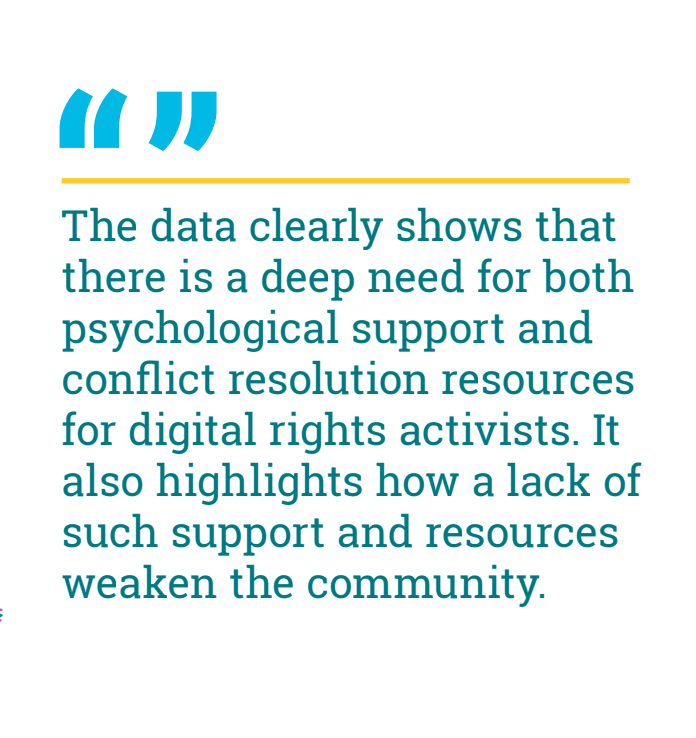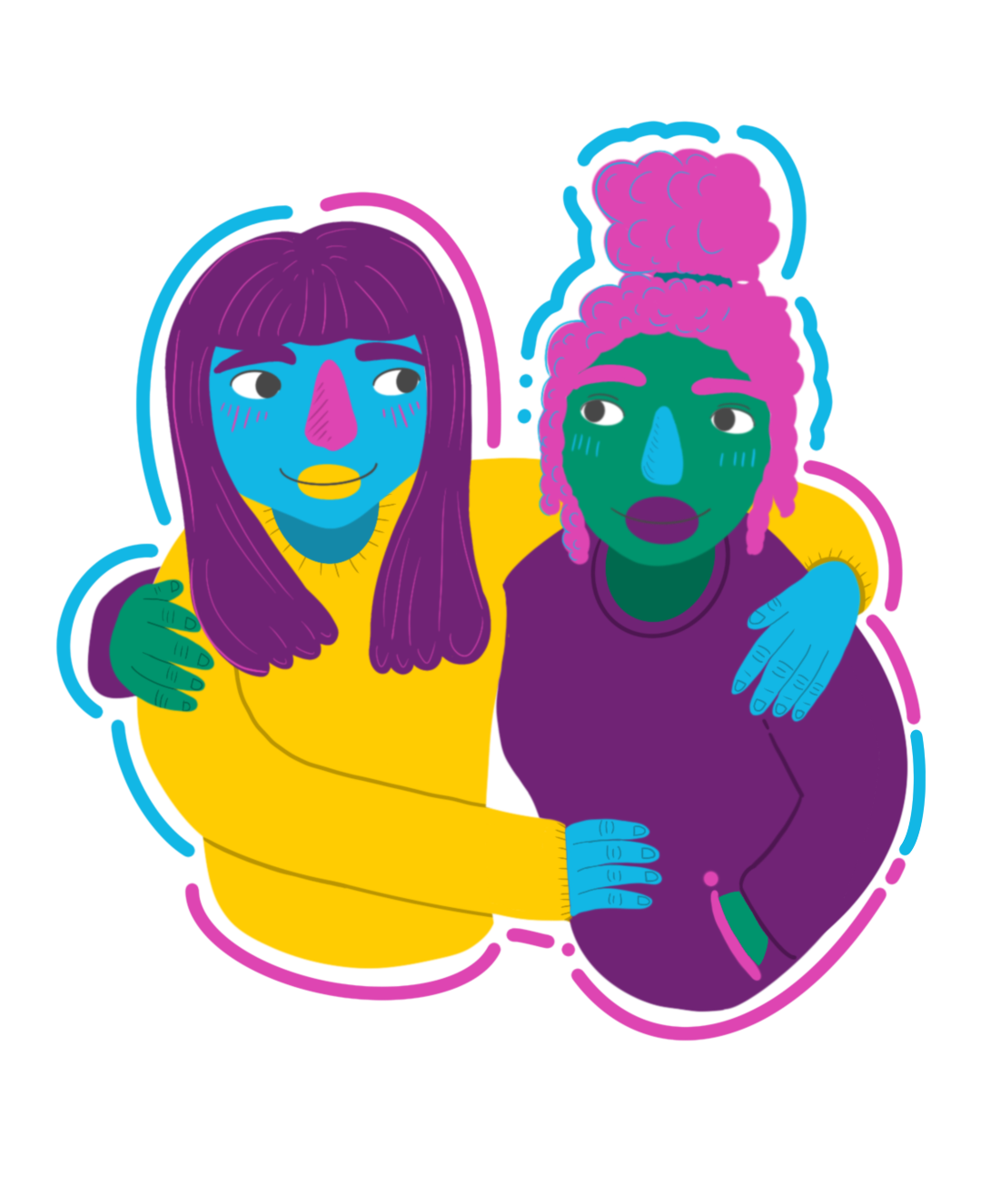Announcing the 2020 Community Health Report
Glittery love to the many digital right defenders and activists for giving us your time and
opening your hearts to take part in this report. Thank you for trusting us with your stories.
We are happy to announce the release of the ”2020 Community Health Report: Building Stronger Communities - The case for mental health support for digital rights defenders”, the first report of its kind in the digital rights space. Through a community lens, the report provide a snapshot of the wellbeing of digital rights and internet freedom networks around the world. It also offers insight into the psychosocial challenges and the impact that the Covid-19 pandemic has had on the mental health of those who work to secure digital rights for all.
What is the Digital Rights Community?
The digital rights community is made up of people who come from several different movements, disciplines, and work in various professional fields around the world. They include grassroots activists, journalists, human rights defenders, open source technologists, privacy and security advocates, and researchers from over 130 countries. What they have in common is their experience of being subjected to, or fighting against the most acute forms of online surveillance, censorship, and digital attacks which are designed to further marginalize and silence them. They believe that digital rights are human rights–the idea that all humans deserve to have privacy, access to information, and the ability to freely express themselves and actively engage in public life without fear of discrimination.
Why this Report is Important
The digital rights community is facing unprecedented levels of stress which is contributing to a decline in mental health, the inability to work productively, and a rise in unhealthy community dynamics. A sample of the report’s findings confirm this reality:
94.4% of respondents report experiencing stress because of an increase in surveillance, censorship, media blackout and/or hate speech. They report an increase in stressors such as being targeted by governments, protests/revolutions, economic collapse, and racial injustices.
85.2% of all participants report experiencing stress due to local or regional instability. This is causing a wide range of movement and migration issues, such as having to go back to countries they have left or having to go into exile.
81.0% of all participants report experiencing stress due to witnessing or experiencing human rights abuses such as unlawful detainment, torture, police brutality. Individuals report being affected by the suffering of others, and as a result are experiencing fatigue; inability to sleep or rest; feeling small or less confident; persistent feeling of being in survival mode; depression; loneliness and isolation.
72.1% of all participants report experiencing stress resulting from loss of work/financial insecurity. There is an overall increase in uncertainty in all areas of life making it hard to plan for the future.
72.1% of all participants report experiencing stress in response to toxicity in professional settings. This is because of persistent, unequal power dynamics that obstruct diversity and inclusion and result in a weakening of healthy relationships within communities.
66% of all participants state that their mental health has regressed in the past year
Despite facing unprecedented challenges which have significantly worsened during the Covid-19 pandemic, mental health support and financial investment into this community has not kept pace. The research shows that community members are facing harder challenges with less support. This is worsened by a decrease in connection and an increase in isolation in the last year that affects their access to the few resources historically available to them.
The data of the report clearly shows that there is an urgent need for mental health support and services, and conflict resolution resources. If community members are not psychologically secure and healthy, it becomes difficult to foster and nourish healthy relationships within the community. In turn, this obstructs the advancement of internet freedom and digital rights goals
Goals of the Report
Based on this context, we designed the report with three main goals:
Provide the community of digital rights defenders with an analysis of their current situation using a psychosocial and community building perspective to both validate their experience and allow them to better identify when they may need interventions or help.
Support organizational leaders and decision makers, and provide them with an evidence base, so they can better strategize and design solutions that help the people they serve become more resilient.
Provide an evidence base to donors so they can fund more psychosocial care for the community and help them remain healthy and vibrant.
We encourage you to read the report in its entirety, as it investigates a vast range of areas from discrimination to toxicity in the workplace, as well as providing resources and tools for support.
The Research
Research has been conducted by Selma Zaki, a licensed mental health counselor, and currently the director of our Community Mental Health Program. The report is a culmination of in-depth qualitative and quantitative research conducted through one-to-one interviews, surveys, and psychosocial workshops that use a participatory research methodology. This methodology builds on the idea that those impacted by the research should take an active role in shaping the questions, designs, and analysis; and determine what actions might be the most impactful in effecting change. It is therefore inclusive by design.
Selma Zaki, Team CommUNITY’s Director of Community Mental Health
Help Us Turn a Negative Narrative into a Beautiful Story of Solidarity
The report highlights an urgent need for both psychological support and conflict resolution resources. It also shows that both the act of sharing one’s trauma, and the knowledge that other people have faced similar experiences, can lower stress levels and reduce feelings of isolation.
Based on these findings, Team CommUNITY will raise over $50,000 over in 2021 to meet the demand for psychosocial care. We will be offering diverse mental health services including self-care group sessions, psycho-educational workshops, and one-to-one check-ins with community members most in need. We will pay particular attention to those from the most marginalized communities.
But we cannot do this alone. We need your support to turn this negative narrative into a beautiful story of solidarity. If you believe in our vision, please consider investing in us. Your generosity will directly improve a digital rights defender’s wellbeing and simultaneously contribute to keeping the internet free, open, and secure for everyone.
A Gift for Our Community
While the findings are stark, we believe that we can pull through this, by focusing on healing together. In coming months, Team CommUNITY will be providing consultation to organizations and networks, helping them strategize on how to prioritize psychosocial care for both their employees and the communities they serve. If you are interested in participating in this initiative, please email team@digitalrights.community for more information.
In addition, we have created a Signal Self-Care Sticker Pack with advice and wisdom that is meant to help individuals navigate these hard times. Thank you for being an amazing community. You are not alone. We have each other and that is quite a lot. Please let us know if we can do anything to help or if you just need an ear.
Check it out the Signal Self-Care Sticker Pack!
One of the many images from the Signal Self-Care Sticker Pack







